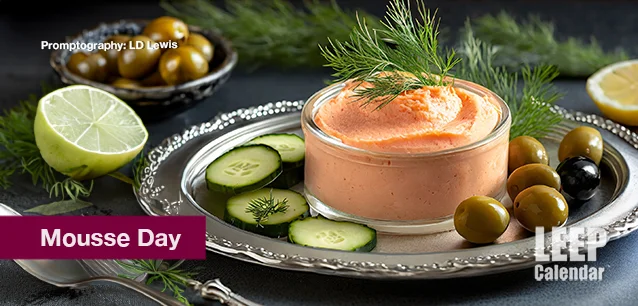 AD
AD
Today is: November 06
Scroll to explore events active on this date.
LEEP INK FEATURES

August? Absolutely!
In August, we live through the Dog Days of Summer. It's hot and often humid, and those who can leave for better climates do. Down south, winter is in full force. August is also known as "the ...

In The Heat of July: July 2025 Events
Is it hot enough (or cold enough if you're below the equator) for you yet? There is actually a day for that! Like every month, I pick a diverse collection of events you may or may not know about. This ...

May Blooms: Events in May 2025
Along with October, May is one of the most densely packed months of the year. It's before the summer humidity and the last whole month of the school year. The weather is warming in t...
About Mousse Day
United States
Ends: Nov 30, 2024
DESCRIPTION:
Mousse Day celebrates the French culinary invention.
Mousse, a light and airy dish known for its creamy texture and versatility has a rich culinary history that dates back to the 18th century. The term "mousse" in French means "foam," aptly describing this delicacy's light and fluffy nature. Mousse can be sweet or savory, with chocolate mousse being particularly renowned.
Mousse originated in France, where it began as a savory dish made with meat or fish. Early versions of mousse were more akin to a pâté, involving a blend of seasoned pureed ingredients, set into a mold, and served cold. The aristocracy favors this mousse form.
The transformation of mousse into a dessert occurred in the mid-19th century. French chefs began experimenting with sweet versions of mousse, incorporating whipped cream and egg whites to create a light and airy texture. Chocolate, with its rich flavor and popularity, quickly became a favored ingredient in sweet mousse recipes.
The first recorded recipe for chocolate mousse in the United States appeared in the 1890s. However, in the 20th century, particularly in the 1960s and 1970s, chocolate mousse gained widespread popularity as a dessert in Europe and America. The film "Rosemary's Baby" might have had a hand in that. Mousse's simplicity and the elegance it brought to the dining table made it a staple in home cooking and restaurant menus.
Modern interpretations of mousse have expanded far beyond the traditional chocolate flavor. Today, mousse can be found in a myriad of flavors, from fruits like raspberry and mango to more exotic varieties incorporating herbs and spices. Though less common than their sweet counterparts, savory mousses are served as appetizers or side dishes.
Mousse preparation typically involves whipping cream or egg whites to incorporate air, creating its signature foam-like texture. When making sweet mousse, ingredients like chocolate, fruit purees, or flavorings are gently folded into the whipped base to retain the lightness.
Mousse is a testament to culinary evolution, originating as a savory French dish and transforming into a beloved dessert worldwide. Its evolution from a meat-based preparation to a sweet, airy delicacy reflects changes in culinary tastes and techniques, solidifying its place in the annals of classic desserts.
VIDEOS
SUPPORTING DOCUMENTS
Currently, this event does not have supporting documents.
ADDITIONAL IMAGES
Currently, this event does not have supporting images.
Where would you like to go now?
 AD
AD


/footer-logo.svg)
